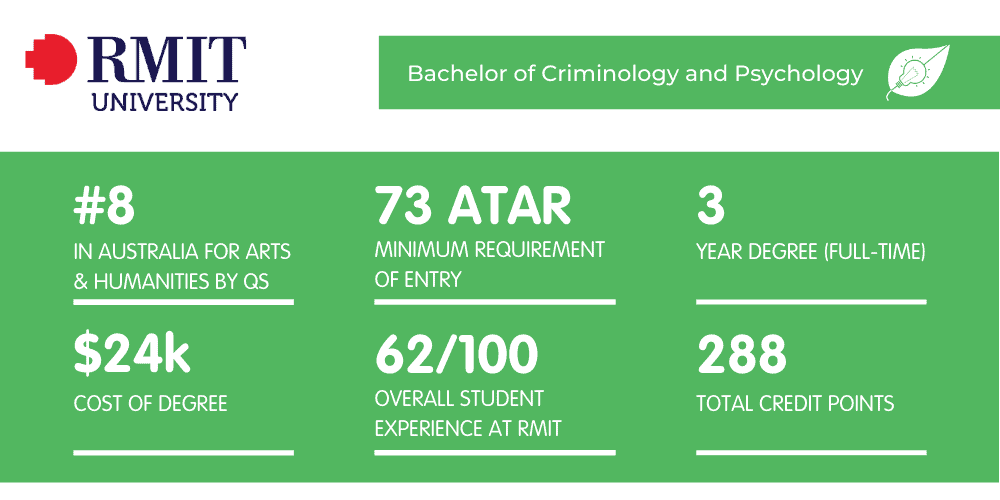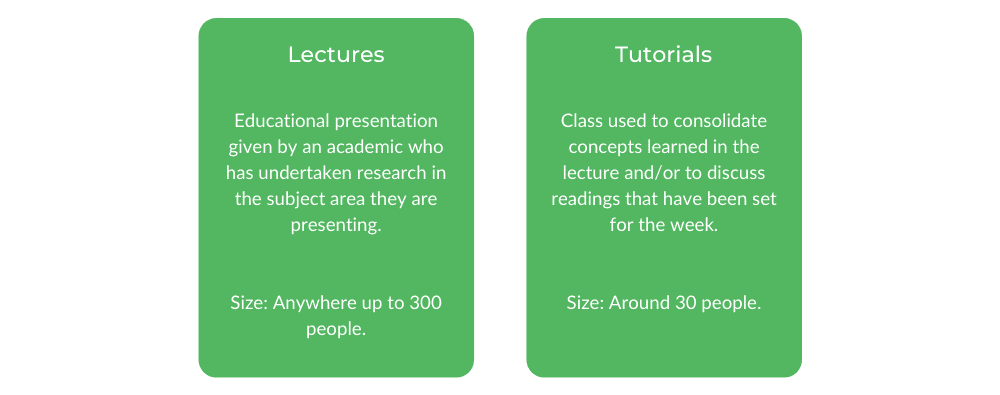
Well, we’ve got you covered because we’re going to take you through everything there is to know about this degree including the class structure, assessments, uni culture, scholarships and more!
Let’s dive on in!
What is a Bachelor of Criminology and Psychology at RMIT?
Core Units for this Degree
How to Get into a Bachelor of Criminology and Psychology at RMIT
What’s the Teaching Format?
What’s the Faculty and Culture Like?
What is a Bachelor of Criminology and Psychology at RMIT?
A Bachelor of Criminology and Psychology at RMIT provides you with a strong understanding of the theories and practices in both criminology and psychology. You’ll learn the skills for forensic interviewing and how to work with a client, managing their needs as their case goes through the justice system.
There’s the chance for you to complete an internship, giving you some real-world experience in the justice and human services field. If you want to become a clinical psychologist, you’ll need to complete postgraduate studies beyond this otherwise, you can also do postgraduate studies in criminology and justice or enter the justice and human services world!
Can it be studied with another degree?
Well, it’s already a double-major degree so you get the best of both worlds with a little bit of criminology and psychology! There’s the chance for you to complete Honours in Justice and Criminology where you’ll work on a research project and write your thesis.
If you’re more interested in the psychology side of the degree, then you can also complete Honours in psychology.
Career Paths
A Bachelor of Criminology and Psychology is a versatile degree so you’ve got a lot of options! It’s a great pathway to study postgraduate justice and criminology or psychology, depending on what you’re most interested in.
Perhaps, you want to go into clinical psychology and decide to continue studying or maybe, you’re set on working for a criminal justice agency.
These are just some of the jobs you could find yourself working in:
-
- Victim support officer
- Corrections officer
- Crime analyst
- Police officer
- Investigator
- Forensic psychologist
- Counselor
- Youth worker
- Education and research
…and the list goes on!
Core Units for this Degree
Over the three years, you’ll complete 12 psychology subjects and 8 criminology subjects. You also get to choose 4 electives from a list of program options which are all related to your degree — so basically you get to specialise a bit and choose the subjects that interest you the most!
First Year
In the first year, you’ll learn the principles of psychology and criminology. So, there’s an Introduction to Law and Introduction to Criminal Psychology.
In Criminological Theory, you’ll draw on different theories and philosophies to understand crime and how it is conceptualised, so you’ll look at human biology, politics and even economics.
Second Year
In the second year, you’ll learn practical skills such as interviewing and how to manage clients. Forensic Interviewing teaches you how to appropriately interview clients in the criminal justice system and how to report that information to courts and various institutions.
In Development Psychology, you’ll look at the development of people throughout different points in their life and issues that are related to those various stages.
Third Year
In your final year, you’ll learn how to manage cases and dive deeper into more advanced criminology and psychology theories. Psychopathology and Models of Intervention will look at various psychological disorders and different approaches for intervention.
Case Management Practice is all about how to work with a client from the moment they enter the criminal justice system to when they leave — so, there’s a lot to consider!
Take a closer look at all the core subjects here!
Electives
You get to choose four electives throughout the degree! There is a huge list of fascinating options — all relating to different aspects of the degree so it’s really up to you as to what you want to specialise in.
There’s Customs and Border Security, Drug Related Crime, Corrections, International Policing and Youth Justice Systems — just to name a few!
Check the rest of your elective options out here!
Internships
Although you don’t have to complete an internship during the degree, there is the chance to choose the Professional Internship elective where you complete at least 20 days of work experience at a justice organisation. So, it’s totally up to you as to whether you want to choose this elective but it’s always a good idea to try and get some real-world experience to see what it’s like and establish a network!
There’s usually a list of possible internship opportunities to choose from or if you happen to find your own one, the work integrated learning coordinator can assist you. Past students have interned with Victoria Police, Corrections Victoria and the Magistrate’s, Children’s and Supreme Court, for example.
There’s also the possibility to do an internship with the Bridge of Hope Initiative which is a joint initiative between RMIT and the Bridge of Hope Foundation where they help people who believe they are wrongfully convicted.
You’ll be assessed on your performance at the organisation as well as through a number of reflective reports, quizzes and WHS activities.
How to Get into a Bachelor of Criminology and Psychology at RMIT
To be admitted into a Bachelor of Criminology and Psychology at RMIT, you’ll need to achieve an ATAR of 73.
Adjustment Factors
Don’t worry if you don’t have the required ATAR because you might be eligible for some bonus points!
If you received a score of 25 in any of the following subjects, you’ll get 2 bonus points for each of those subjects (the most bonus points you can get is 8).
-
- Biology
- Business Management
- Health and Human development
- Legal Studies
- Any Mathematics
- Australian politics, Global Politics
- Psychology
You can find more info on adjustments factors here!
Prerequisites
You’ll need to have completed Australian Year 12 or the equivalent of it!
To be eligible for the degree, you’ll also need to have completed:
-
- English (EAL) units 3 & 4: scored at least 30 OR
- English other than EAL units 3 & 4: scored at least 25
Scholarships
There are all sorts of different scholarships you can apply for at RMIT which can be found here!
Check out the McCraith Scholarship in Criminology as it’s aimed at students studying this degree who are disadvantaged in some way — check out the link for more info to see if you’re eligible.
What’s the Teaching Format?
A Bachelor of Criminology and Psychology at RMIT is taught through lectures and tutorials. Now, take a breath, the degree is delivered across semesters.
Class Structure
Lectures
You could have anywhere up to 300 people in a lecture and these go for around two hours. Be ready to write a lot of notes because there is a fair bit of theory in this degree, so there’s plenty of information to digest!
Tutorials
You’ll have around 30 people in each tutorial and these go for around 1-1.5 hours.
You’ll go over what you’ve learnt in the lecture that week, do some group activities to consolidate your knowledge and discuss the assignments for the subject. So, that might be practicing your forensic interviewing skills, discussing different psychological theories or looking at a case study in depth.
How much time do you spend on campus?
If you study a Bachelor of Criminology and Psychology at RMIT full-time, you’ll usually take four subjects a semester.
So, you can expect to have around three contact hours for each subject which totals to around 12 contact hours a week! Plus, don’t forget, you’ll also have to do a fair bit of work in your own time — readings, revising content, exam preparation and assignments.
What are the assessments like?
In terms of assessments, you’ll have quite a mix in this degree! You’ll have a combination of essays, reflections, case studies, risk assessments, online quizzes and presentations as well group work assignments.
For some subjects such as Forensic Interviewing, Psychological Assessment and Individual Differences and Principles of Psychology plus a few others, you’ll also have an exam — so it really depends on the subject!
Skills That You Refine and Learn
You’ll definitely develop your understanding of different psychological theories and how the justice system works. Specifically, you’ll develop your forensic interviewing skills, learn how to do risk assessments and manage caseloads.
You’ll refine your communication and research skills because you’ll have to write a lot of essays and you’ll also do a fair few presentations! Don’t worry, presenting in front of the class gets a lot easier with practice.
You’ll learn how to work well in a team as most subjects have at least one group assignment. If you do decide to do the Professional Internship, it’s a great chance to put all the theories you’ve learnt into practice and further refine your skills.
What is the Faculty and Culture Like?
It’s easy to make friends within the degree because everyone has at least two things in common: they’re passionate about justice and intrigued by the human mind. So, you’re already off to a good start when you begin!
The culture is relaxed and friendly, everyone is welcomed and RMIT offers a lot of awesome opportunities! You have the chance to really get involved, from volunteering as a student ambassador to joining one of the many societies to travelling overseas!
Most of the lecturers and tutors are still working in the industry and at the same time, also teaching you! So, you’re learning from people who have a lot of experience and are up-to-date with the latest developments and knowledge. That means, you’ll be taught by actual psychologists and those who have experience working in the justice system or are currently conducting research projects.
You’ll definitely want to check out and join the Psyched Psychology Society who run postgrad talk nights, get psychologists to come in so you can ask all those questions about the job, have movie/bar nights and of course, the highly anticipated Psyched Ball!
Future Edge Program
This program is all about increasing your employability and developing those skills that employers seek out! It’s taught through a series of different workshops and the best part is — you can complete the program at your own pace.
You’ll start with a workshop on ‘Defining your goals’ and develop your own personal plan. You’re then encouraged to do co-curricular activities and attend various workshops which focus on cover letters, interview skills, Australian workplace culture and etiquette plus more.
And finally, you’ll be able to talk about your skills and experiences in a professional environment!
Wondering what the pros and cons of this degree are? Find out in our article here!
Tanna Nankivell is a Senior Content Writer at Art of Smart Education and is currently in Germany completing a year of study for her double degree in Communications (Journalism) and Bachelor of Arts (International Studies). She has had articles published on Central News – the UTS Journalism Lab and wrote a feature piece for Time Out Sydney during her internship. Tanna has a love for travel and the great outdoors, you’ll either find her on the snowfields or in the ocean, teaching aqua aerobics or creating short films.





